Oliver Plunkett was born in Loughcrew, Meath, Ireland in 1629 to privileged parents of good lineage and land ownership. Until the age of 16, he was educated by his cousin, the Abbot of Saint Mary’s in Dublin. In 1645 he set out for Rome under the care of Father Scarampo of the Roman Oratory, and stayed at the Irish College where he had a brilliant academic career. The Rector later said that Plunkett “devoted himself with such ardor to philosophy, theology, and mathematics, that in the Roman College of the Society of Jesus he was justly ranked amongst the foremost in talent, diligence, and progress in his studies… and was a model of gentleness, integrity, and piety.” He was ordained a priest in 1654, and elected by the Irish bishops to act as their representative in Rome.
As anti-Catholic sentiment grew throughout England, Oliver was unable to return to Ireland. He asked to stay on in Rome and, in 1657, became a professor of theology at the College of Propaganda Fide. In 1669, he was appointed Archbishop of Armagh, the leader of the Church in Ireland. After pleading his case, he was allowed back into Ireland as laws were becoming slightly more tolerant. He was also granted the right to wear the Pallium, a strip of white cloth made from lamb’s wool collected by Trappist monks, and a sign of Papal authority.
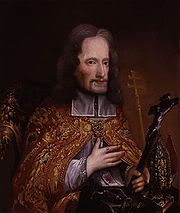 His time in Ireland was described by a contemporary: "During the twelve years of his residence here he proved himself vigilant, zealous, and indefatigable, nor do we find, within the memory of those of the present century, that any primate or metropolitan visited his diocese and province with such solicitude and pastoral zeal as he did, - benefiting, as far as was in his power, the needy; wherefore he was applauded and honored by both clergy and people."
His time in Ireland was described by a contemporary: "During the twelve years of his residence here he proved himself vigilant, zealous, and indefatigable, nor do we find, within the memory of those of the present century, that any primate or metropolitan visited his diocese and province with such solicitude and pastoral zeal as he did, - benefiting, as far as was in his power, the needy; wherefore he was applauded and honored by both clergy and people."Following Bishop Plunkett’s return to Ireland, he began the rebuilding and reorganization of the Catholic Church. Saint Oliver oversaw the construction of new schools and seminaries. He also denounced the drunkenness that was common among the Irish clergy, saying, “Let us remove this defect from an Irish priest and he will be a saint.” Following the easing of Penal Laws, Saint Oliver was able to establish a Jesuit College in Drogheda, in 1670.
As the persecution of Catholics increased, a series of laws were passed to restrict the role of priests and bishops. Known as the Test Acts, Oliver publicly denounced the laws, and as a result, the Jesuit college he had founded was burned. Saint Oliver was forced into hiding, traveling in disguise, and lived in exile. He lived as a secret bishop for years, enduring hunger, cold, and fear, refusing to abandon his flock, and content in his suffering for the Lord. In one of his letters, Saint Oliver described the hardships he endured:
"The snow fell heavily, mixed with hailstones, which were very large and hard. A cutting north wind blew in our faces, and snow and hail beat so dreadfully in our eyes that up to the present we have scarcely been able to see with them. Often we were in danger in the valleys of being lost and suffocated in the snow, till at length we arrived at the house of a reduced gentleman who had nothing to lose. But, for our misfortune, he had a stranger in his house by whom we did not wish to be recognized, hence we were placed in a garret without chimney, and without fire, where we have been for the past eight days. May it redound to the glory of God, the salvation of our souls, and of the flock entrusted to our charge."
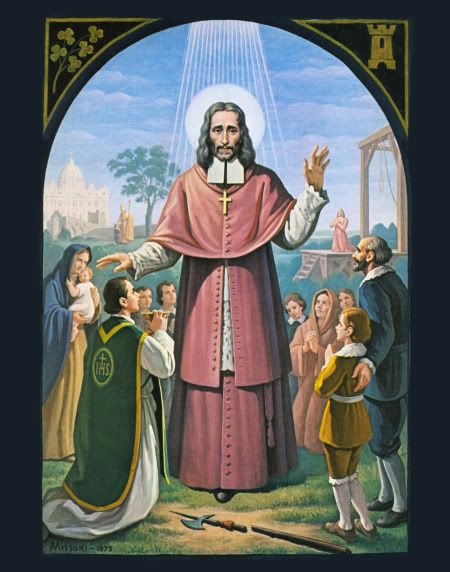 Eventually, Saint Oliver was arrested, and accused of treason—a false charge contrived to remove him from power. During his trial, he was accused of assisting with both a French plot to invade Ireland, as well as inciting an Irish uprising against English rule. The grand jury in Dublin found no evidence to support the indictment, and therefore he was transferred to Newgate Prison in England to stand trial there. While evidence was gathered, Saint Oliver was kept in solitary confinement for six months, not allowed to gather witnesses in his own defense.
Eventually, Saint Oliver was arrested, and accused of treason—a false charge contrived to remove him from power. During his trial, he was accused of assisting with both a French plot to invade Ireland, as well as inciting an Irish uprising against English rule. The grand jury in Dublin found no evidence to support the indictment, and therefore he was transferred to Newgate Prison in England to stand trial there. While evidence was gathered, Saint Oliver was kept in solitary confinement for six months, not allowed to gather witnesses in his own defense.The second trial, held in London, was a “kangaroo court.” Lord Campbell, writing of the judge, called it a “disgrace” to himself and his country. Plunkett was found guilty of high treason “for promoting the Catholic faith,” and was condemned to a gruesome death: ” . . . through the City of London to Tyburn; there you shall be hanged by the neck but cut down before you are dead, your bowels taken out and burnt before your face, your head shall be cut off, and your body divided into four quarters to be disposed of as her majesty pleases. And I pray God to have mercy on your soul."
Shortly before his death, Saint Oliver penned the following letter:
“The kindness and charity of your lordship are such that you have been pleased to express appreciation of my poor service in cultivating the vineyard of the Lord in this afflicted country and in corresponding with the Holy see, venerated and loved by me with a spiritual affection and reverence, as also with an earthly affection because as a good mother it nourished me for many years in Rome while I lectured there, as well as with other honors too great for my weakness to bear. God knows that I think of nothing else, day and night, than the service of souls, which is the service desired of me by the Sacred Congregation and the Holy See. Political or temporal matters have no part in my life: neither in my mind nor on my lips nor with my pen are they given any place. God knows how I labored last year, 1670, in visiting six large dioceses, in holding a provincial council and various diocesan synods, and how I labored this present year in the dioceses of Clogher, Down, and Dromore, as well as my own.
We are in greater fear and trembling here now. In Scotland parliament has decreed that for the future it will be a lese-majesty to hear Mass. It seems as if the times of Nero, Domitian, and Diocletian have come round again. We shall have martyrs’ blood to irrigate and fertilize the Church. These edicts do not as present include Ireland, because it is not named by the King in them, but I am sure that, as usual, we shall not be forgotten.
Sentence of death was passed against me on the fifteenth. It has not caused me the least terror or deprived me of even a quarter of an hour’s sleep. I am as innocent of all treason as the child born yesterday. As for my character, profession and function, I did own it publicly, and that being also a motive of my death, I die most willingly. And being the first among the Irish, I shall, with God’s grace, give good example to the others not to fear death. I expect daily to be brought t o the place of execution where my bowels are to be cut out and burned before my face, and then my head to be cut off. What speech I will have at my death will be sent to you. If I had obtained sufficient time to have brought my witnesses from Ireland, I think I should have defended myself as regards these romances of treason; but it was not granted to me, and I was brought to my trial destitute of all legal ways of defense.”
After publicly forgiving all who contributed to his sentencing, Saint Oliver Plunkett was martyred on July 11, 1681. He was the last Catholic to die for his faith at the notorious execution spot Tyburn in London, England. He was the first of the Irish martyrs to be beatified. The entire incident of his arrest and trial was immediately recognized as a travesty of justice, and as a result, many English Protestants converted to the faith. The Earl of Essex, the former Viceroy of Ireland, petitioned King Charles to pardon Plunkett before the execution, assuring him of Plunkett's innocence. The King is said to have lost his temper and replied "Why did you not attest this at the trial? It would have done him some good then. I dare not pardon anyone. His blood be upon your head not mine." The man responsible for Plunkett’s arrest was subsequently arrested and imprisoned.
A well respected young woman, from a highly regarded Catholic family, Elizabeth Shelton, petitioned the King to recover Saint Oliver’s remains immediately after the execution. She, accompanied by the faithful, received the head and other 'quarters' after the bowels had been cast into the fire. Some parts were buried in the north wall of Saint Giles cemetery. She saved the head and two forearms, which were eventually entrusted to the Sienna Nuns of the Dominican Convent at Drogheda. They are presently on view, enshrined in Saint Peter's Catholic Church in Drogheda, as is the door of the cell the saint occupied at Newgate. Pilgrims visit this holy site, and miracles have been reported at his intercession.
St. Oliver Plunkett: Pray for us.
St. Oliver Plunkett, Archbishop of Armagh: Pray for us.
St. Oliver Plunkett, Primate of all Ireland: Pray for us.
St. Oliver Plunkett, martyr for the faith: Pray for us.
St. Oliver Plunkett, first of the canonized Irish saints: Pray for us.
St. Oliver Plunkett, model for the Irish Priesthood: Pray for us
St. Oliver Plunkett, who risked the chance of death and returned to Ireland in penal times: Pray for us.
St. Oliver Plunkett, model of the Christian life: Pray for us.
St. Oliver Plunkett, sentenced to death by hanging, drawing and quartering: Pray for us.
St. Oliver Plunkett, last to die at Tyburn for the faith: Pray for us.
St. Oliver Plunkett, who like Jesus prayed for his persecutors: Pray for us.
St. Oliver Plunkett, who faced martyrdom with serenity: Pray for us.
St. Oliver Plunkett, protector of the holy faith planted by Saint Patrick: Pray for us.
St. Oliver Plunkett, whose message was one of serenity and peace: Pray for us.
St. Oliver Plunkett, who was a model of reconciliation: Pray for us.
O God, who rejoices with the memory of Saint Oliver Plunkett, Bishop and Martyr, mercifully grant that we may be assisted by his merits, by whose life we are illumined. Through Jesus Christ, your Son Our Lord. Amen.
Year 2: Day 192 of 365
Prayer Intentions: Comfort in our suffering; Union with Christ.
Requested Intentions: For a daughter’s successful examination results (A); Occupational success, health and safety of family (S); Reduction in anxiety for husband, financial freedom (S); Healing for a sister-in-law (J); For a family experiencing a difficult child custody case (M); Reunification of a family struggling with separation (M): For a son struggling with mental illness (M); Successful examination results (B); To be freed from the chains of sin (J); Admission to a good university (M); For successful surgery (T); For a mother’s mental health and for kindness and forgiveness, for housing problems, for dental health (T); For the soul of a departed friend (X); Restoration of health (D); Successful employment for couple (N); For employment for children (K); For health of friend, for successful relationships for children, for safe pregnancy for daughter (C); For the health of a mother (J); Virtue for daughter (V); Successful acceptance to college for nephew (M); For the health of a cousin (T); Freedom from legal difficulties for husband (S); Husband’s freedom from illness (L).







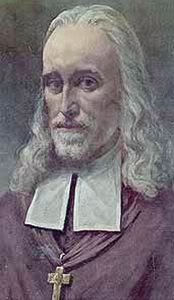
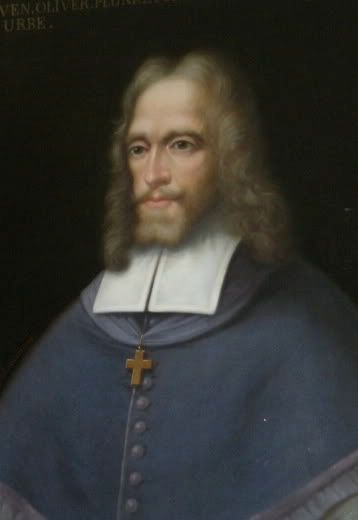
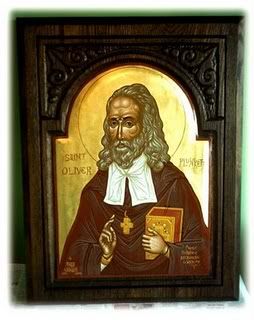
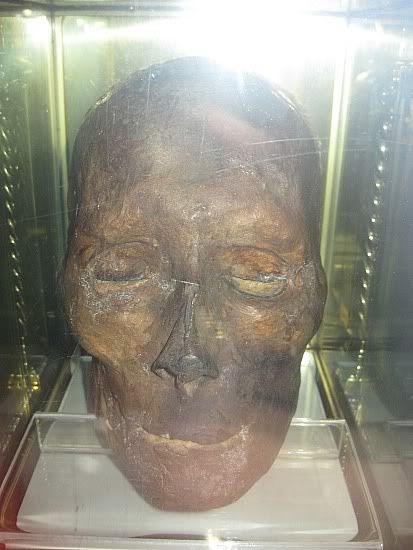
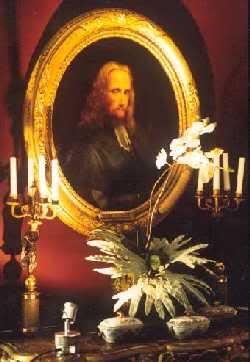
0 comments:
Post a Comment
Thanks for leaving a comment. If you wish to submit a prayer request, however, please do so above, using the "Contact" tab.